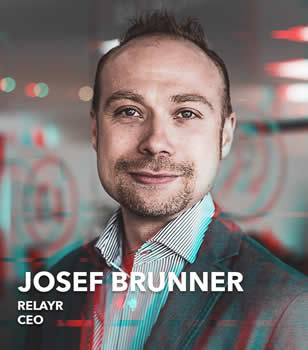Early September 2018 US-based HSB Group (part of insurance group Munich Re) announced the acquisition of Industrial IoT solutions company relayr. The acquisition is now closed and strengthens the ‘business outcomes’ strategy HSB Group and relayr have been working on. An overview.
In the land of Industry 4.0, Berlin is the capital of the Industrial IoT start-up scene. Moreover, according to many – including Tom Casaer of AllThingsTalk – Germany’s Berlin most probably will be and remain the global Industrial IoT capital (also think about the investments of Siemens in its Siemensstadt 2.0).
Relayr, nowadays describing itself as an IIoT powerhouse and, among others, known for its industrial IoT platform, is one of the success stories that is rooted in the Berlin IoT start-up scene (relayr mainly focuses on larger industrial forms but also on small to midsize enterprises, especially in this IIoT space).
As mentioned in a March 2018 article on the rapid growth and strategic success of relayr, the company is ranked in several reports such as the MachNation 2018 AEP ScoreCard, to name just one. In that same article we also covered the background of the German company, its investors, its business strategy and the main features of a recent version of the relayr Industrial IoT middleware platform.

The acquisition of relayr by HSB Group: $251.7 million in cash after accounting for the 15.51% of HSB’s previous minority interest
While we first guessed the company might ultimately be acquired by Deutsche Telekom, early September 2018 news broke that relayr was acquired by insurance group Munich Re, more specifically HSB Group (just like Deutsche Telekom – via Deutsche Telekom Capital Partners or DTCP – one of its existing partners and investors – via Munich Re/HSB Ventures).
End October 2018 the acquisition was closed. HSB Group, a subsidiary of Munich Re acquired 100 percent of the company’s shares and equity interests for $251.7 million in cash after accounting for the 15.51 percent of HSB’s previous minority interest in the company.
HSB, short for Hartford Steam Boiler, is specialized in equipment breakdown insurance and different types of specialty insurance and reinsurance coverages such as data/cyber risk and identity theft insurance. The US company (based in Hartford, Connecticut) worked with relayr on the development of financial insurance regarding IIoT project investment risks since quite some time as explained in the earlier mentioned blog post.
It’s perhaps not your typical business strategy as we often see it in the IoT platform market but it’s a key reason why HSB and thus Insurance Re bought relayr according to HSB CEO Greg Barats.
Enabling customers on an OpEx-based digital transformation journey
In fact, the comments of Barats on the closing of the acquisition, which was funded through a capital contribution from Munich Re, are pretty similar to those he shared at the occasion of the 2016 Series B funding round announcement from relayr (led by Munich Re/HSB Ventures).
Quoting from the October 2018 press release on the finalization of the acquisition: “There are tremendous opportunities to develop new insurance and other financial products that provide assurance to industrial and commercial companies looking to make significant investments in IoT. This acquisition enables relayr to offer a unique combination of IoT consulting and software with the financial assurance of a warranty.”
Relayr will now report to Barats, who is also globally in charge of Munich Re’s IoT business.
The messaging regarding the acquisition keeps going in the same direction as it has been going since quite some time: a focus on business outcomes, rather than IoT or technology – and with the enabling of digital transformation being key in the overall approach.
Or, as one might also say, a narrative that appeals to decision makers in organizations who prefer to speak about goals such as reducing costs, increasing energy efficiency, improving quality and business model change (as in ‘real digital transformation’).
That is something relayr and Munich Re have understood faster than many other players in the IoT and ‘industrial transformation/innovation market’ who often are still stuck in a narrative of revolutions and “the next big thing”.
Speaking the language decision makers understand in the as-a-service economy
It’s not that relayr doesn’t speak about artificial intelligence, fog computing, edge computing, digital twins and so forth, on the contrary. The company’s IIoT solutions include all that and more. Yet, it’s about whom you talk to.
And the last time we checked a focus on business outcomes with a messaging – and, obviously the supporting offering, in this case among others insurance – that also addresses fears, among others regarding ‘change’ and technologies and risks, still tends to appeal more to the folks that ultimately sign the deals and those who give the ‘go’ for payments. And that is rarely a CIO.

In the previously mentioned post we touched upon the rationale that when converting from CapEx to OpEx-based business models, new issues of liquidity and risk arise. Relayr CEO (and investor) Josef Brunner pointed out another benefit of the business strategy: long-term partnerships on the road to these OpEx-based as-a-service and pay-per-use business models.
To get there, he said, a combination of technology, services, insurance and financing are key. The technology and (consulting) services are what relayr offers and the insurance and financing, well, we just explained it.
Or as Brunner also put ii in the first announcement regarding the acquisition by HSB Group: “The unique combination of the companies demonstrates the importance to deliver business outcomes to customers and the need to combine first-class technology and its delivery with powerful financial and insurance offerings. This transaction is a great opportunity to build a global category leader.”
That’s the goal, the rest is wait and see – and for some perhaps learn.
While relayr will retain its brand and be an independent entity within HSB Group, it will also strengthen its partnership with the rest of the Munich Re family the announcement further states.
All images belong to their mentioned owners.

